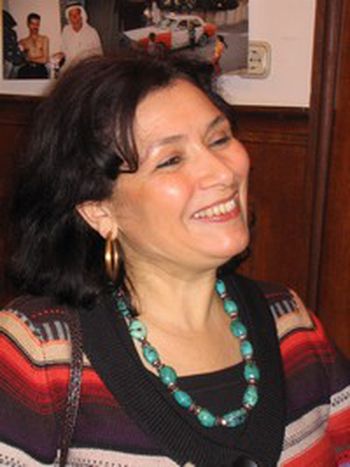
Sihem Bensedrine, Ben Ali’s fearless antagonist
Published on
Translation by:
G. RingTunisian journalist Sihem Bensedrine, 56, was threatened, imprisoned and tortured in her native country – but not silenced.
You only have to spend five minutes with Sihem Bensedrine to feel the fierce commitment of this petite woman.
She arrives late for the interview, apologising while catching her breath. Just as we begin talking the phone rings. The International Freedom of Expression Exchange (IFEX), whose weekly bulletin is published by Bensedrine, is requesting a phone conference. After a short discussion with her colleagues, she abruptly interrupts the conversation and finally sits down with a sigh.
Battle against oppression
Despite her 56 years, Bensedrine has a youthful appearance, with dark eyes full of life and brown curls tied up in a short pony tail.
Four years ago, Bensedrine was exiled to Hamburg. Here, in an old building in the Schanzen district, she lives in an apartment with her family. Her daughter goes to school in Hamburg and her son studies in France.
Yesterday evening she returned from Casablanca and early tomorrow morning she flies to Lagos to take part in a conference organised by the Network of African Freedom of Expression Organizations (NAFEO). This afternoon she must travel to Berlin to apply for a visa for Nigeria.
"It’s not in my nature to submit," Bensedrine says when talking about her life. In 1987, Zine El Abidine Ben Ali staged a coup d’état in Tunisia. He abolished press freedom at the beginning of the 90s and fought Islamist fundamentals in the country.
"Many people were tortured to death," Bensedrine says. She documented the atrocities and spoke with families of the victims. Her commitment dates back. Before Ben Ali came to power, Bensedrine had already campaigned for social justice and was a board member of the Tunisian League for Human Rights. When for the first time, press gained greater freedom, she became a journalist. “It was an exciting challenge the monopoly of the official state media,” she says.
Spied on, arrested and tortured
Yet her activism made her a dangerous target for Ben Ali. He ordered reprisals against her and her family. The secret police spied on the family for years. Bensedrine’s passport was confiscated for two years and her husband put under house arrest and he lost his farm, his only livelihood. Her daughter’s dog was hung. Bensedrine was defamed and beaten on the street on repeated occasions. In 2000, her ribs were broken, and her spine and one of her eyes damaged while in prison. She was arrested again a year later.
In 2002, the Hamburg Foundation for the Politically Persecuted invited Bensedrine to stay in their town for a year. With no improvement in sight for the journalist’s situation, the grant was extended thanks to the funding of private sponsors. She is now a guest of the International Authors Association, PEN, in Germany.
Bensedrine likes Germany. As long as there is no change of government in her country, she would like to stay. The Tunisians appreciates the Germans and their way of life. "I like it that people don’t cross the street when the lights are red. Here people respect rules,” she says with a smile. “In my country, there are no laws that apply to everyone and which can be used as a reference.”
How things will continue for her family next year is still unknown. “My daughter would like to know if she can do her final school exam here. I can’t plan our personal future.” For a split second, the fighter appears worn out. "I would like to return to Tunisia and lead a normal life there.”
Hypocritical Europe
During her exile, Bensedrine and her husband Omar Mestiri wrote a book entitled "Despoten vor Europas Haustür" (“Despots on Europe’s Doorstep”), in which she criticises the EU’s support for the authoritarian regime in North Africa. "If Europe’s democratic heads of state tolerate dictators in Africa, then they shouldn’t be surprised that people from these countries try to flee to Europe."
Bensedrine complains that the vast majority of Africa’s population has no access to their own country’s resources and funds. "We emigrate because we have no future in our native country and Europe is partly responsible for this situation."
Translated from Sihem Bensedrine, Ben Alis mutige Gegnerin



